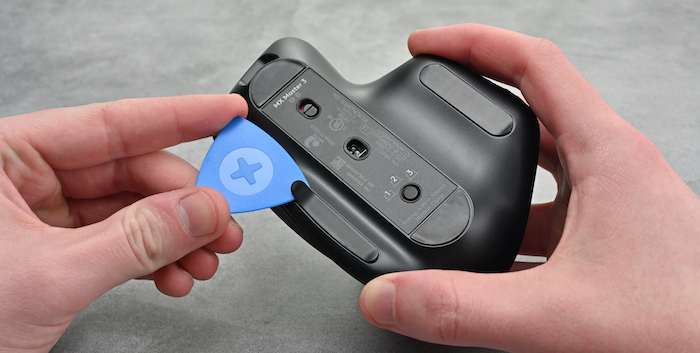
Logitech has joined the likes of Google and Samsung in tagging iFixit to help build a self-repair program. iFixit will sell spare parts for Logitech’s MX Master and MX Anywhere series of mice and provide relevant repair guides in the US this summer.
The iFixit Logitech Repair Hub will stock parts for what iFixit claims are the most common repair needs, namely replacing the mice’s feet and rechargeable battery and opening the device.
“Once in store, the replacement parts for feet and batteries will be available for purchase individually or in our complete-solution Fix Kits,” iFixit said, noting that the kits include tools like opening picks and a screwdriver handle and bits.
Neither iFixit nor Logitech has provided a detailed parts list or pricing, but iFixit promised that guides made by the brands’ collaboration will be sufficient for helping “even the most novice fixer.”
Elizabeth Chamberlain, director of sustainability at iFixit, said in a statement that the company has also been working with Logitech to help develop product designs that support DIY repairs.
When considering the growing concern that is e-waste, it’s not hard to see why Logitech is encouraging DIY repairs. In its announcement, Logitech pointed to The Global E-waste Monitor 2020 report from United Nations Institute for Training and Research that predicted that global e-waste would reach 74 million metric tonnes by 2030 after reaching 53.6 million metric tonnes in 2019.
A simple problem like a dead battery can result in the average consumer considering a mouse is trash even if it works otherwise. And once that mouse is considered dead, it may or may not be recycled. The Environmental Protection Agency has reported that only 38.5 percent of consumer electronics get recycled properly. Making products with designs meant for easy repairs and even upgrades is a way to address these concerns.
It’s why companies like Google, Samsung, Valve (with iFixit), and Apple (independently) have launched programs enabling DIY repairs in recent years. Such announcements get vendors some clout, but the right to repair is about more than just making self-repairs possible. As iFixit’s announcement pointed out, self-repair programs should also make repairs “feasible” for consumers.
Apple, for example, has faced a lot of criticism from right-to-repair advocates like iFixit for its approach to user repairability. A top concern is its program’s requirement of a serial number or IMEI for spare parts.
“This strategy hamstrings third-party repair with feature loss and scare tactics and could dramatically limit options for recyclers and refurbishers, short-circuiting the circular economy,” iFixit’s Chamberlain wrote in an April 2022 iFixit blog post.
Logitech MX Master mouse series
This week, the Halte a L’Obsolescence Programme (HOP)—the same rights group that filed a complaint about Apple slowing iPhone performance, leading France to fine the Cupertino giant $25 million in 2020— announced that France’s public prosecutor has opened an investigation into Apple, following HOP’s complaint of alleged “planned obsolescence and obstacles to repair.” The complaint targets the Apple repair program’s serial number requirements.
This summer, we’ll get a better look at Logitech’s program with iFixit to see if it does a sufficient job of providing parts and guides to consumers. As it stands, the program only targets two mice series from Logitech’s deep collection of products; expanding the program would make it more impactful.
When it comes to sustainable designs, there’s always room to grow (hot-swappable switches for Logitech’s many mechanical keyboards come to mind). But for what it’s worth, the MX Master, including the latest MX Master 3S and MX Anywhere are some of Logitech’s most popular and well-known mice series, especially for power users.
